This document summarizes a research article that discusses developing critical thinking through the teaching and learning process. It explores the dichotomy between criticality and lack of critical thinking. It discusses how teaching can facilitate the transition from common sense to critical thinking and help form students' critical senses. The research aims to present foundations for developing critical thinking from a sociocultural, environmental, political and economic perspective through teaching and learning. It argues that interaction and relationships in learning play an important role in developing students' critical thinking skills.
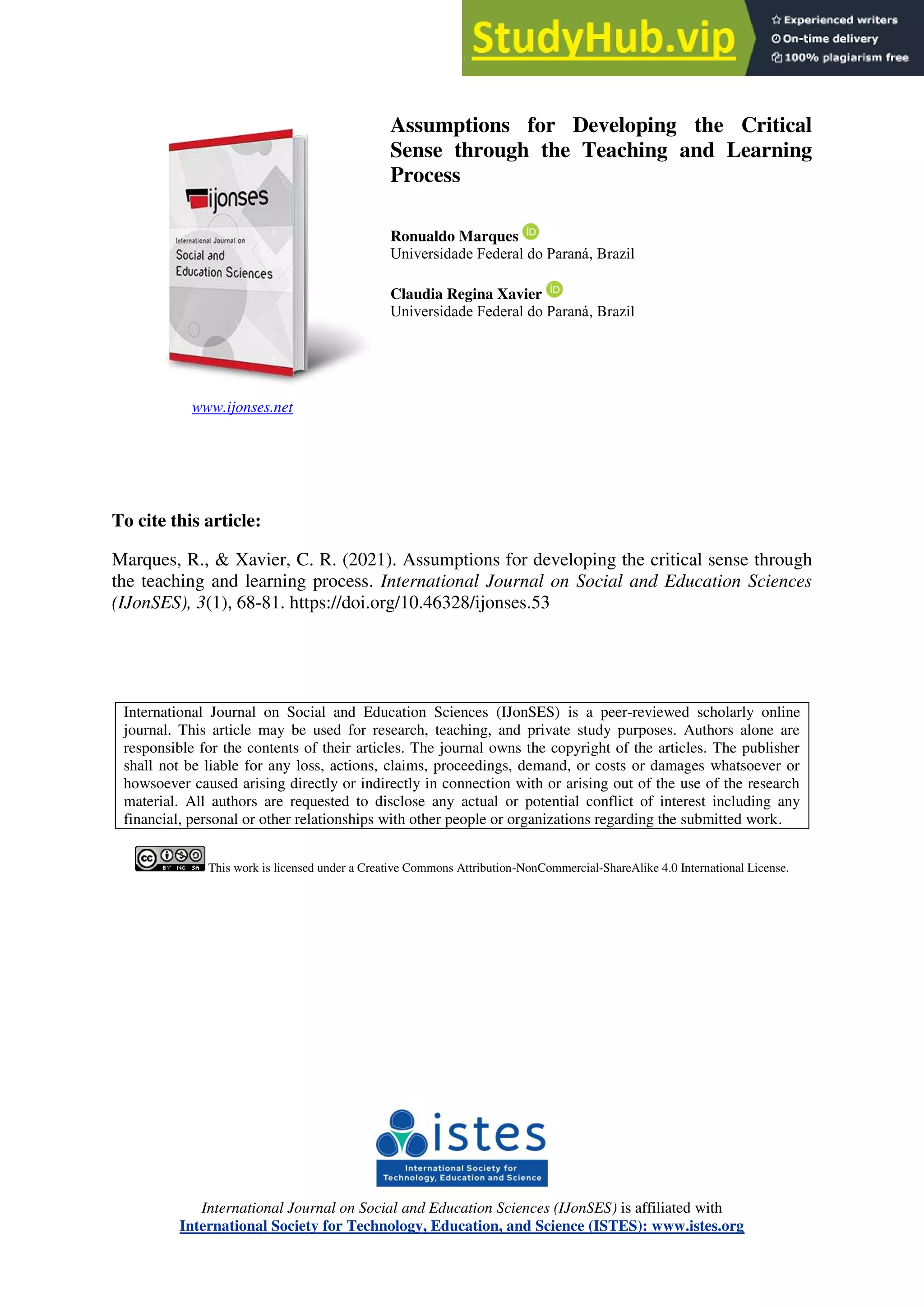
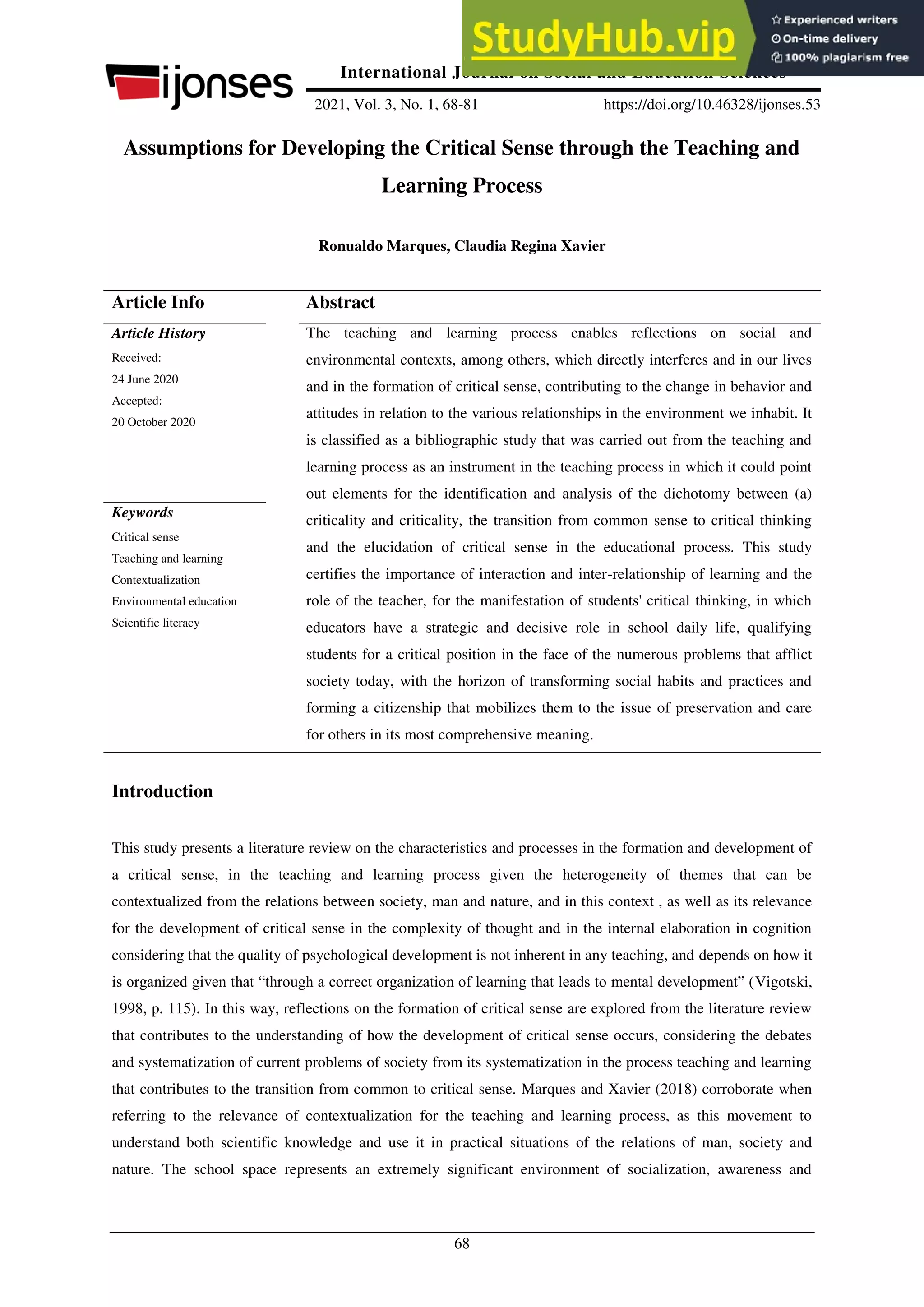
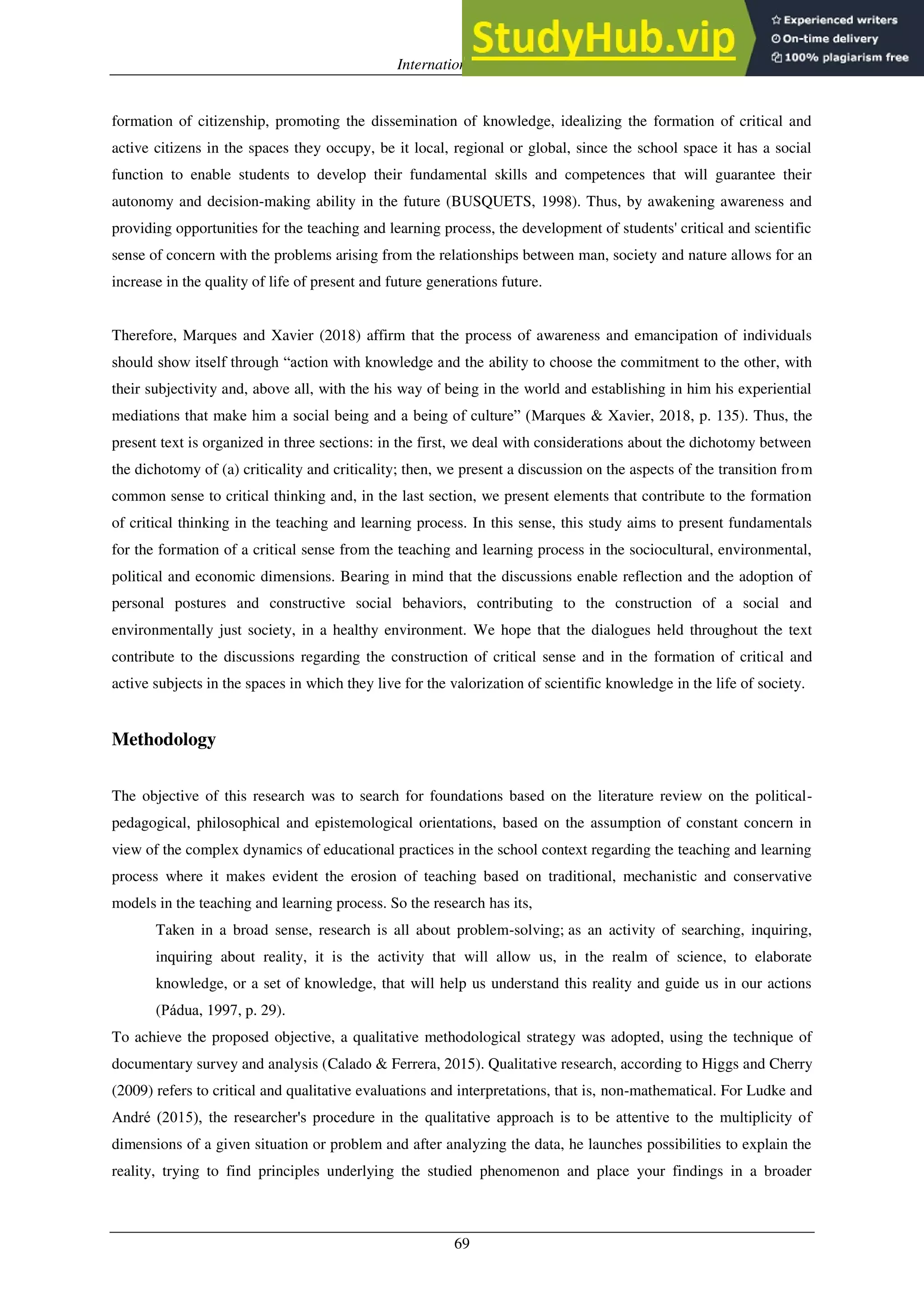
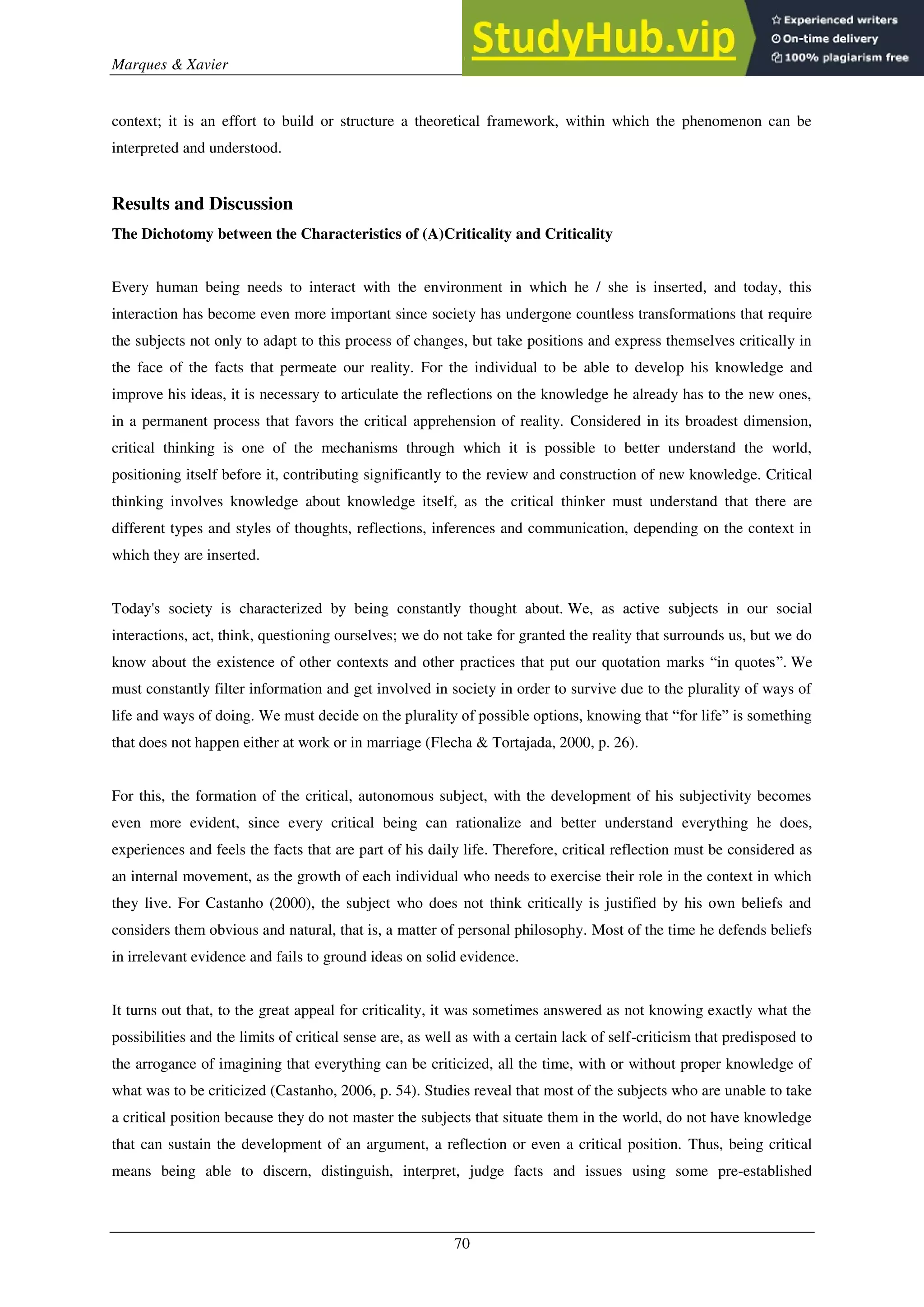
![International Journal on Social and Education Sciences (IJonSES)
71
criteria. Using these criteria, it is possible to analyze a certain situation and, through criticality, demonstrate a
positive or negative position in the face of such a situation. It is perceived, therefore, that the criticality will
serve to mediate the positioning on a given subject, since through the criticality the reasons that instigated to
take this or that position can be pointed out.
In any case, critical evaluations cannot be permeated with arrogance; on the contrary, they must present a certain
vision, a possible reading that is not merely guided by subjectivity. We cannot say that a situation is wrong or
unacceptable because it does not match my personal values, as this goes so far as to put me as a reference in the
world. However, I cannot fail to affirm - that yes - that, we live the values that I live and cultivating the criteria
that I cultivate, I have a negative personal reading in relation to the mentioned situation (Regis Morais, 2000, p.
56).
Criticism is not permeated by tensions or conflicts, but is based on the serenity of mature arguments, because at
the moment when the subject is critically positioned, his individuality must be respected and the individuality of
other people too, since the sense critic needs to guarantee harmonious coexistence between different subjects.
Criticizing means evaluating situations, pronouncements, using well-defined and well-explicit criteria, so that
the critical exercise does not lose its dimension of relativity:
[...] criticality is something in need of comprehensiveness, because first of all, we will need to critique
existence as a whole: in its historicity, in its politicity, in its affectivity and in its production of
intellectual goods. After all, we cannot resign from the only thing that differs from other animals on the
zoological scale: our condition as thinking beings (Regis Morais, 2000, p. 57).
Criticism cannot be conceived as a thought process without guidance, on the contrary, it must have a very well-
defined purpose in the face of problems that must be analyzed beyond our own personal intentions and actions.
Being critical, according to Carraher (2011), involves an intellectual curiosity that is based not only on
satisfying and solving problems through social conversations. Intellectual curiosity depends on an investment of
the individual for a long time in order to understand phenomena deeply.
The person with a critical sense raises doubts about what he believes, rigorously explores alternatives through
reflection and evaluation of evidence, with the curiosity of those who are never satisfied with their current state
of knowledge. It tends to be a producer of knowledge rather than a consumer of previously ready knowledge,
thus, it does not passively accept the ideas of others. Most of the time his curiosity is so keen that he ends up
finding questions of interest in phenomena that others do not think it necessary to explain.
In addition to this attitude of intellectual curiosity mentioned by Carraher (2011), the critical thinker, according
to the author, needs to have a tolerance and even predilection for cognitive states of conflict, in which the
problem is not yet fully understood. Thus, the critical subject,
[...] he cannot be distressed when he does not know 'the correct answer, this anxiety can prevent further
exploration of the problem. Second, having intellectual curiosity implies having intellectual honesty,
which is not simply a question of the individual's character. The less demanding thinker with himself](https://image.slidesharecdn.com/assumptionsfordevelopingthecriticalsensethroughtheteachingandlearningprocess-230806172914-81dc227a/75/Assumptions-For-Developing-The-Critical-Sense-Through-The-Teaching-And-Learning-Process-5-2048.jpg)
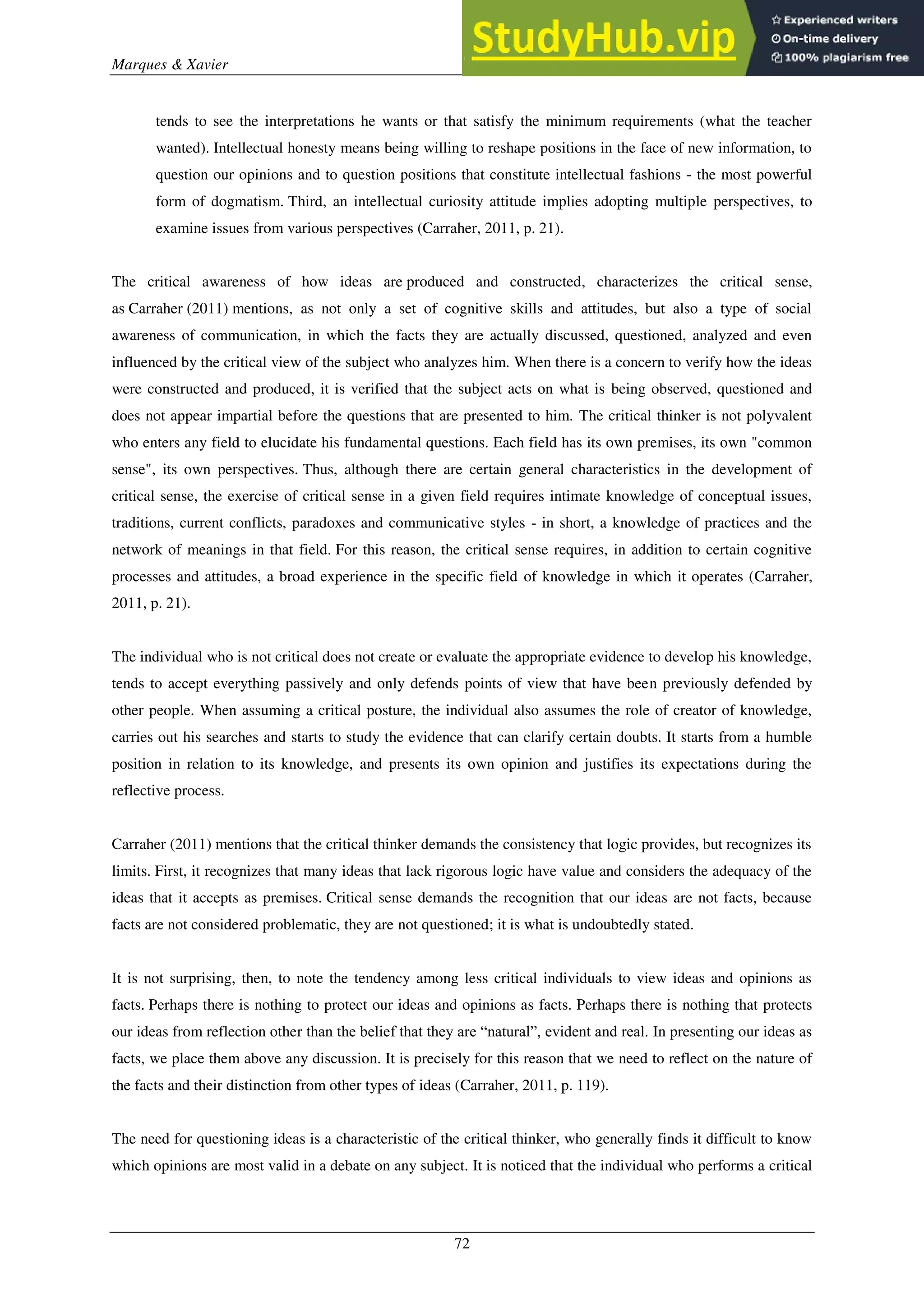
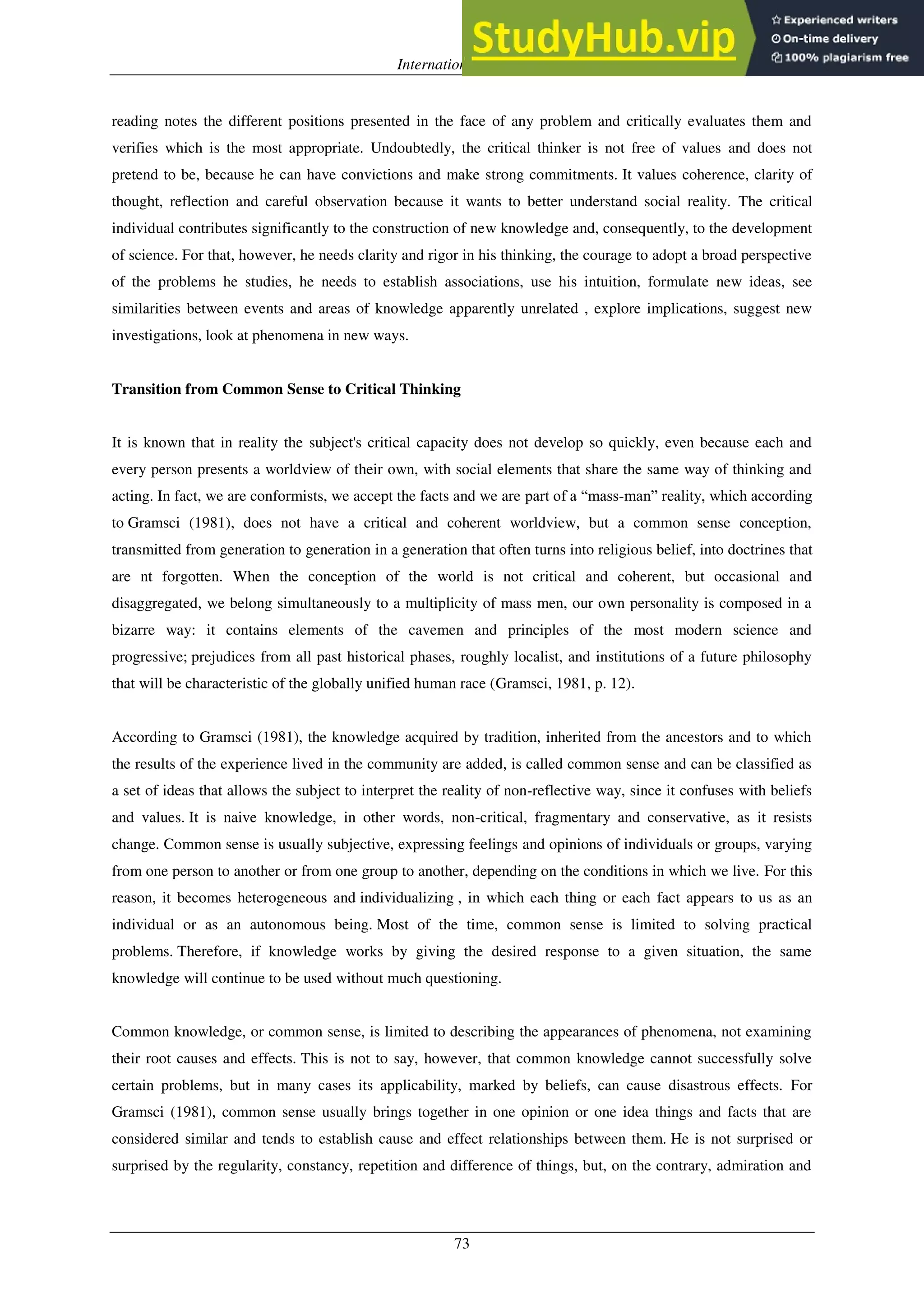
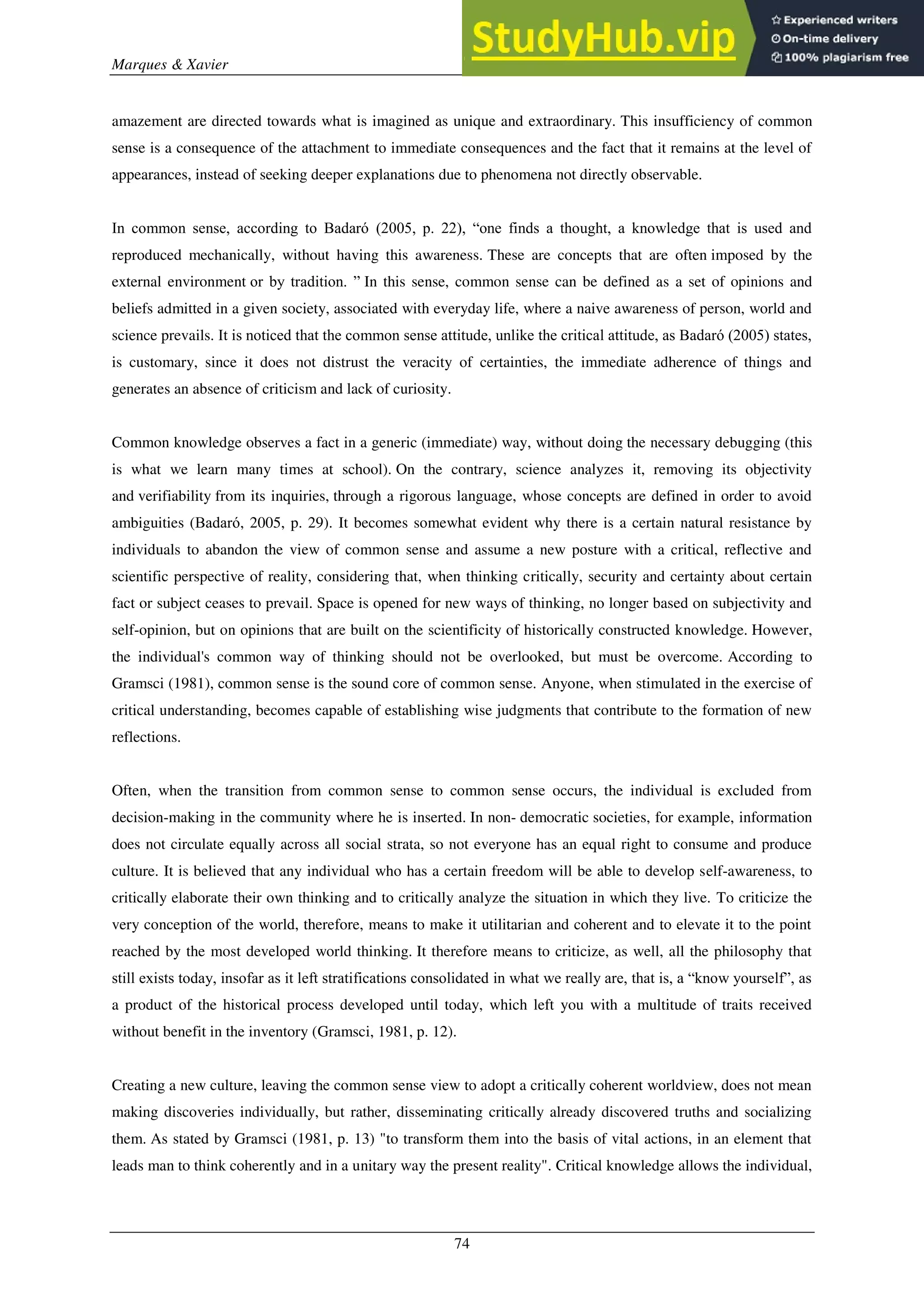
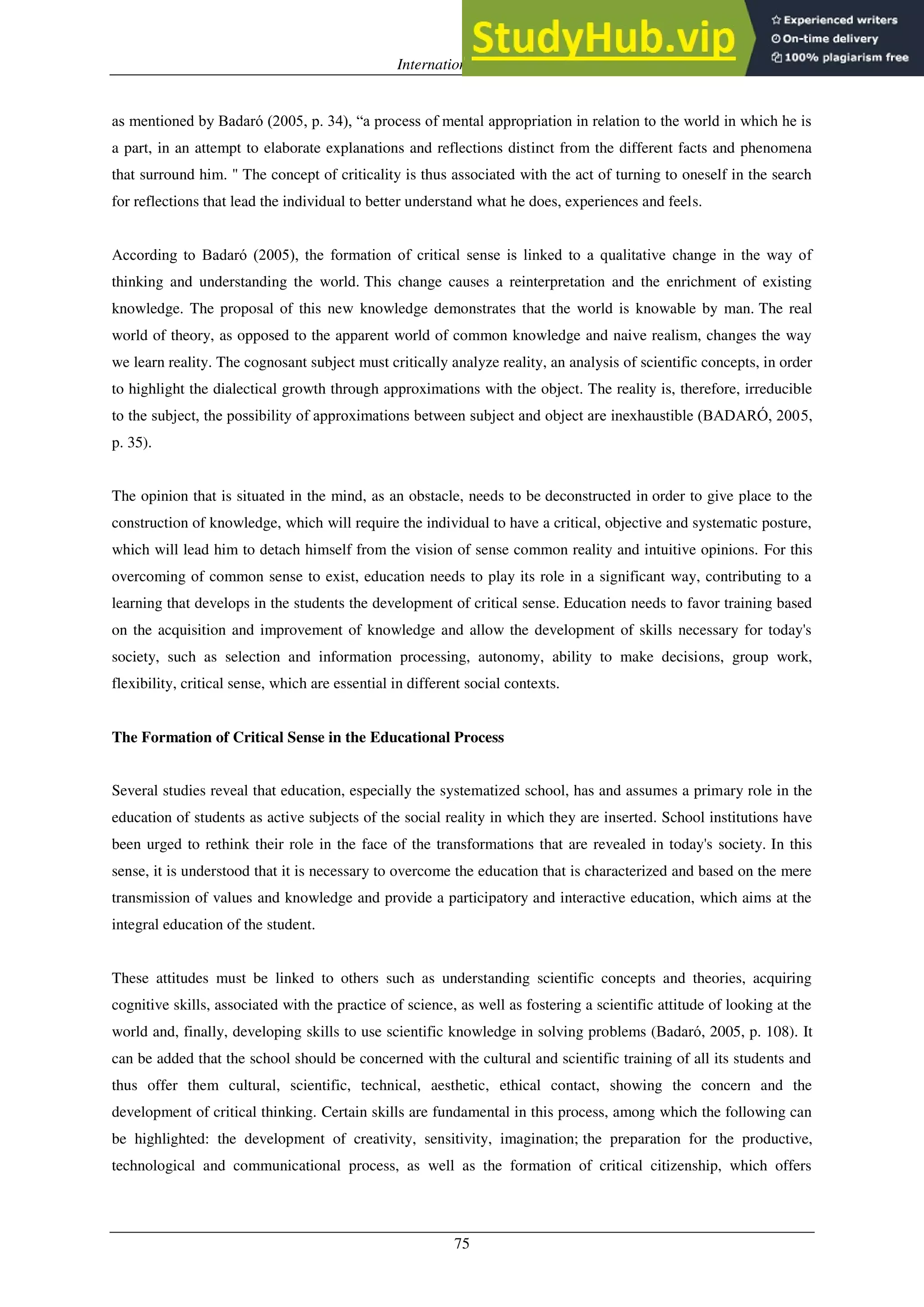
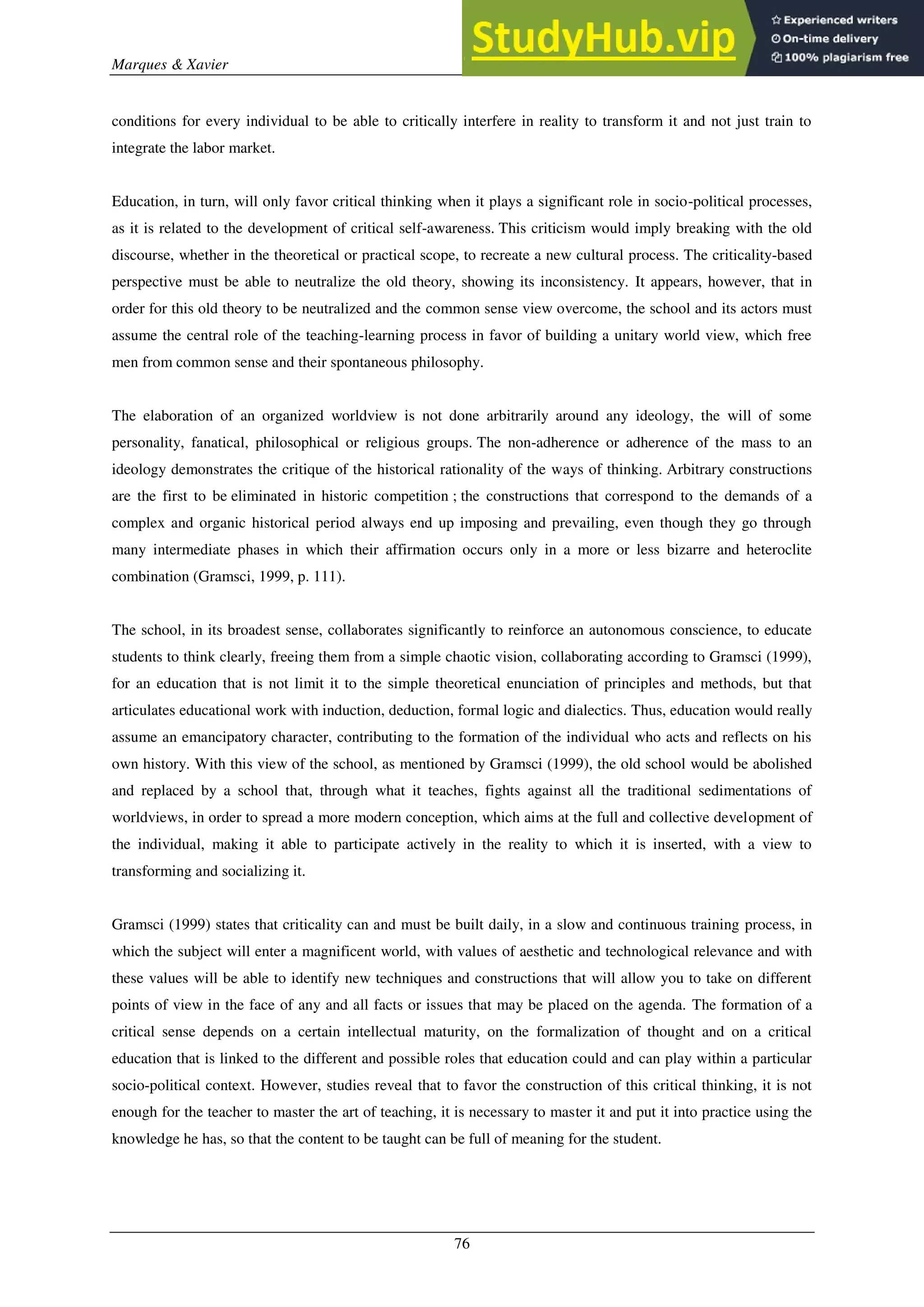
![International Journal on Social and Education Sciences (IJonSES)
77
[...] critical sense depends on a certain intellectual maturation and formalization of thought not found in
children, even the most intelligent. Critical thinking refers to skills already developed (and not just
potential), presumably through reading, reflection and practice itself (Carraher, 2011, p. 20).
Therefore, the teaching-learning process should foster the development of skills that lead the individual to a
critical and reflective formation and the teacher offers subsidies for the student to raise his level of information
that is fundamental to the problematization and apprehension of reality. The teacher cannot assume a practice
without reflection, nor be impartial in the face of historically constructed knowledge, as this attitude will portray
his lack of commitment to the social, cultural and intellectual formation of his student. It is noted that the
teacher needs to be committed to research and critical analysis that verifies certain theories and practices. He
needs to favor the enrichment of his student's intellectual repertoire and this will only be built through the
practice of differentiated readings and related to the content worked in the classroom or to the facts and daily
events. The teacher must at all times instigate his student to read, research, experience situations so that this
cognitive universe can be expanded daily. It is from these cognitive experiences that the student will be able to
express ideas with expressiveness, argue to defend them or deny them, using his creativity, giving a different
approach from the already known.
In this sense, “the intellectual authority” mentioned by Carraher (2011) needs to be left aside and human
coexistence will be constituted through the struggle of intelligences, that is, the confrontation between the
different ways of reading and understanding reality. Education in the information society must be based on the
use of communicative skills, in such a way that,
Allow us to participate more actively and more critically and reflexively in society. If we intend to
overcome the inequality that generates the recognition of certain skills and the exclusion of those people
who do not have access to information processing, we must think about what kind of skills are being
strengthened in the formative contexts and whether it is easier to interpret the from a transforming
perspective (Flecha & Tortajada, 2000, p. 31).
Education needs to break with traditional discourse based on conservative theories, which advocate education
based on reproduction, and adhere to an integrative, participatory and permanent process, based on the joint
action of all those involved in the process, without any type of exclusion. , offering answers to students' needs.
The formation of a critical subject must cease to be the privilege of a portion of our society, making it necessary
for a greater number of people to enjoy this infinite wealth of subjects and areas of information. The educational
reality needs to contemplate the human experience, to make possible at all times a meaningful learning that
takes into account the specific characteristics of each student, compensating for the differences, not harming the
individuality nor the formation of the critical sense.
Education needs to change its culture, overcoming the culture of individualism, which is so present within
educational institutions, by a culture based on shared work, based on the development of open activities that
contribute to the formation of democratic citizens and, above of everything critical. Anyway, changing people is
not enough to transform education and its consequences. We do have to change people and educational and](https://image.slidesharecdn.com/assumptionsfordevelopingthecriticalsensethroughtheteachingandlearningprocess-230806172914-81dc227a/75/Assumptions-For-Developing-The-Critical-Sense-Through-The-Teaching-And-Learning-Process-11-2048.jpg)
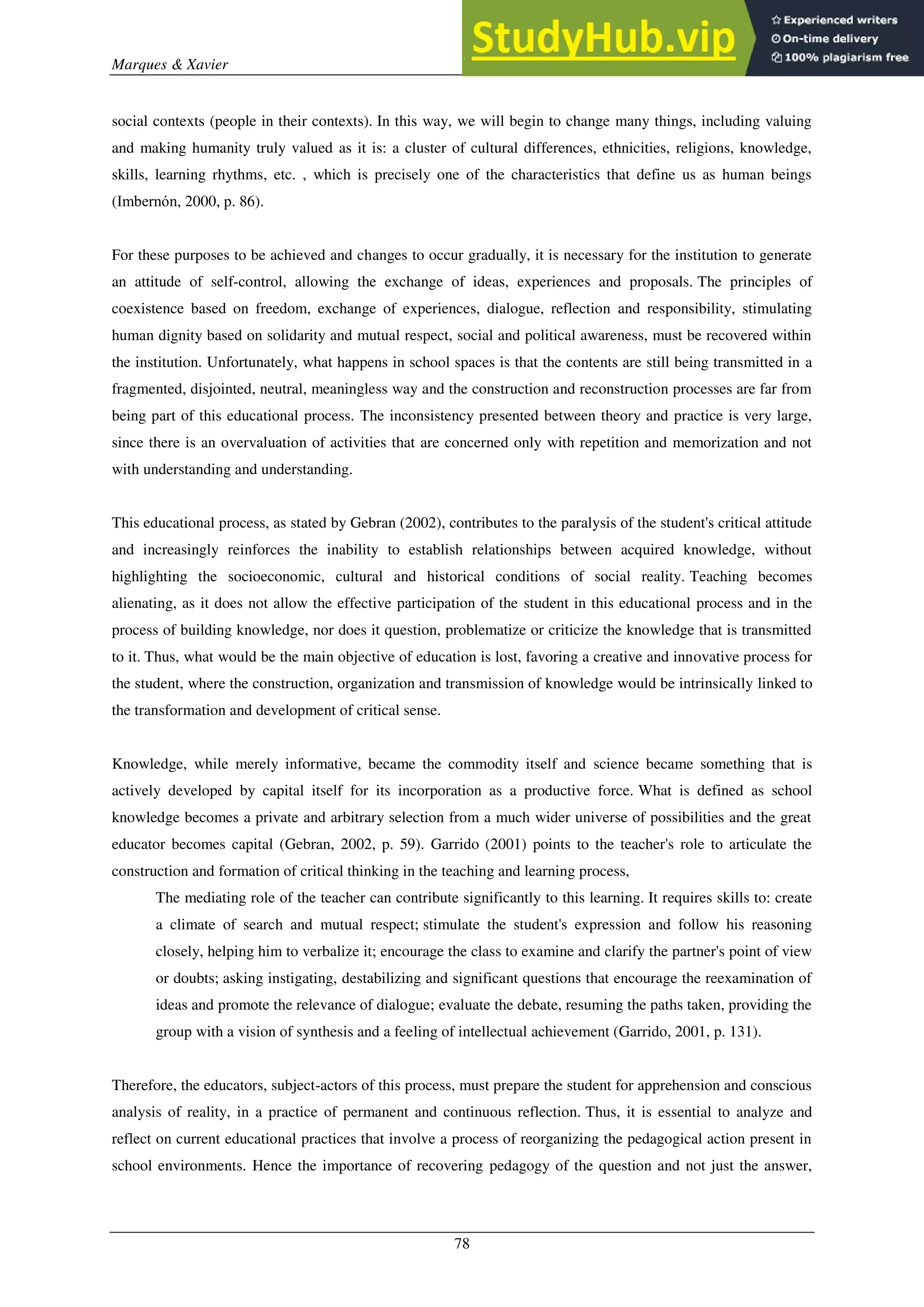
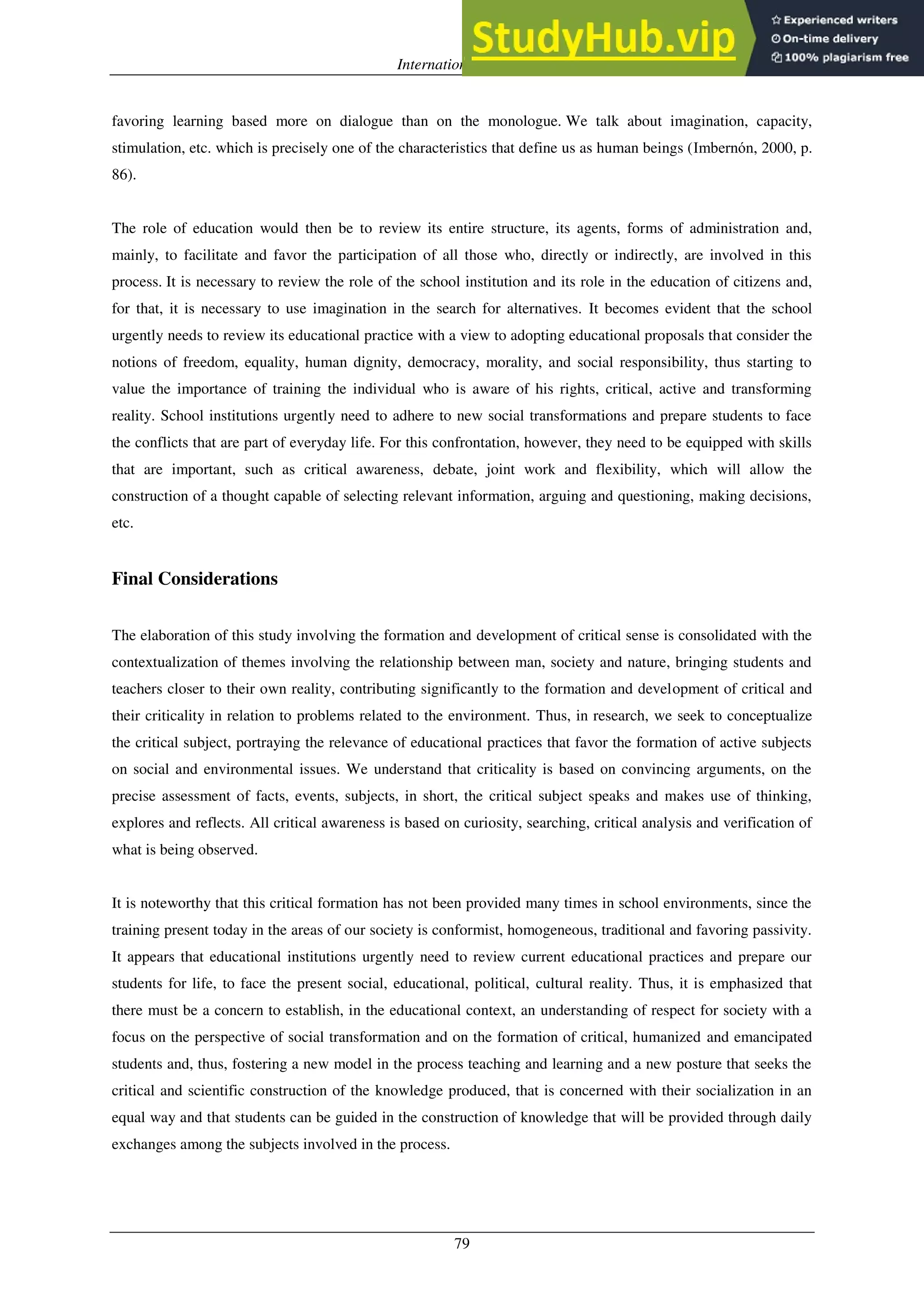
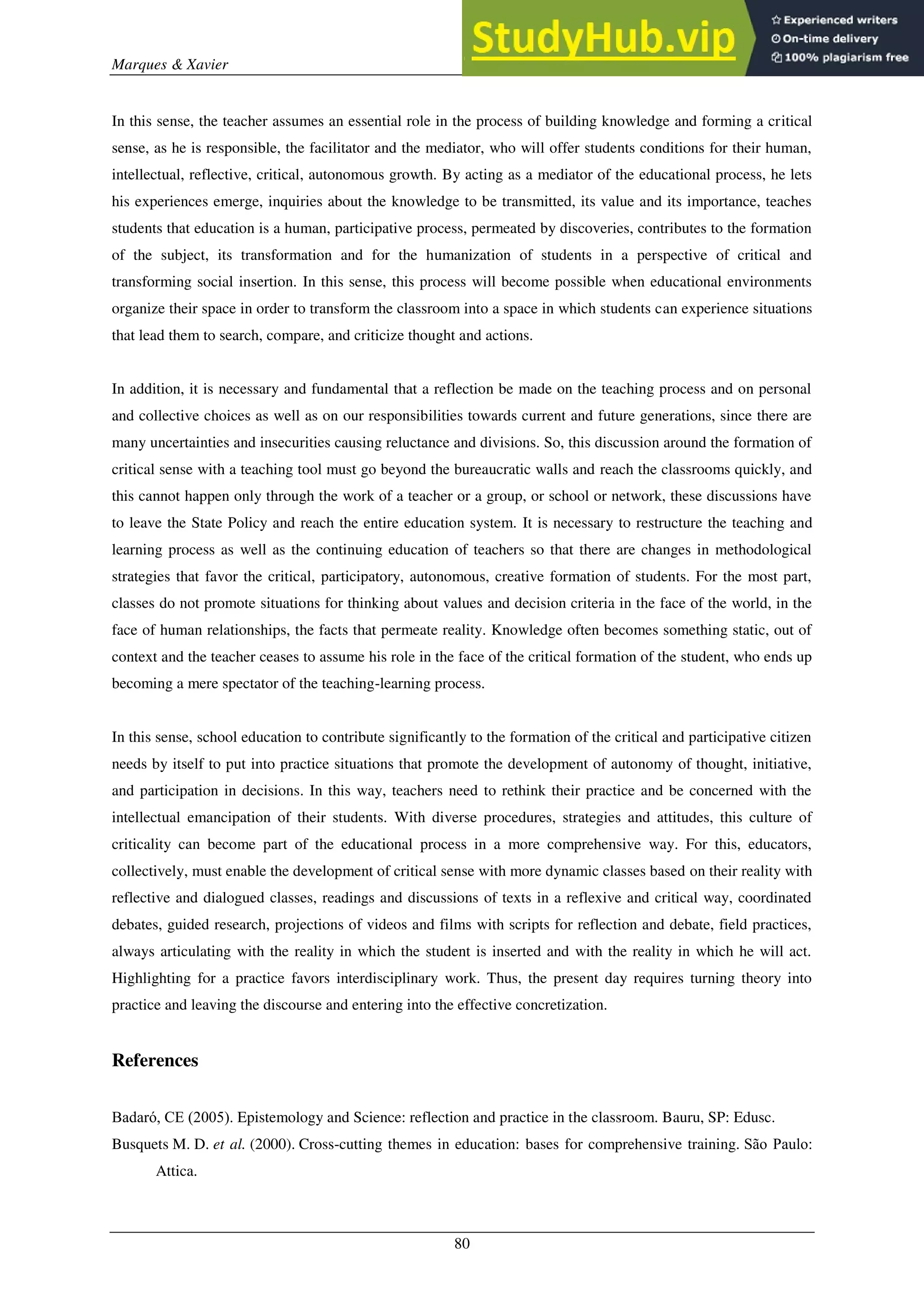
![International Journal on Social and Education Sciences (IJonSES)
81
Calado, S. S; Ferreira, SCR (2005). Document Analysis: Data Collection and Analysis method. Research
Methodology I. Department of Education, Faculty of Sciences, University of Lisbon.
Carraher , D. W (2011). Critical sense: from day to day to the humanities. 9. ed. São Paulo: Pioneer.
Castanho, M. E (2006). Creativity in the university classroom. In: VEIGA, IPA CASTANHO, MELM (Orgs.)
University pedagogy: the class in focus. Campinas: Papirus, p. 75-90.
Flecha, R.; Tortajada , I. (2000). Challenges and educational solutions at the beginning of the
century. In: Imbernón , F. (Org.) Education in the 21st century: the challenges of the immediate
future. 2. ed. Porto Alegre: Artmed, p. 21-36.
Garrido, E. (2001), For a new school culture: the mediating role of the teacher between the student's culture and
the elaborated knowledge. In: SEVERINO, A. J .; FAZENDA, ICA (Orgs.) Knowledge, research and
education. Campinas: Papirus, p. 125-142.
Gebran , R. A (2002). Space and citizenship: the social construction of geographic knowledge. In: FERRI,
LMGC Education, society and citizenship. Londrina: [sn].
Gramsci, A. (1981). Dialectical conception of history. 4. ed. Rio de Janeiro: Brazilian Civilization.
Gramsci, A. (1999). Introduction to the study of philosophy. Benedetto Croce's philosophy. Rio de Janeiro:
Brazilian Civilization.
Higgs, J; Cherry, N. (2009) Doing qualitative research on practice. In: HIGGS, J; HORSFALL, D; GRACE, S.
(Eds.). Writing Qualitative Research on Practice. Rotterdam (NE): Sense Publishers , p. 3-12.
Imbernón , F. (2000). Wide and deep look: education yesterday, today and tomorrow. In: Imbernón , F. (Org.)
Education in the 21st century: the challenges of the immediate future. 2. ed. Porto Alegre: Artmed, p. 77-
94.
Ludke , M; André, M. (2015). Education research: qualitative approaches. Sao Paulo, EPU
Marques, R., & Xavier, C. (2018). Analysis of Critical Sense in a Didactic Sequence in Environmental
Education. REMEA - Electronic Journal of the Master in Environmental Education, 35 (1), 132-150.
Available at: https://periodicos.furg.br/remea/article/view/7430
Padua, EMM (1997). Research methodology: theoretical-practical approach . 2. ed. Campinas, SP : Papirus.
Regis Morais, JF (2004). Creativity as a human foundation. In: VEIGA, IPA; CASTANHO, MELM (Orgs.)
University pedagogy: the class in focus. 4. ed. Campinas: Papirus, p. 51-74.
Vigotski, L. S. (1998). The social formation of mind. São Paulo, Martins Fontes.
Author Information
Ronualdo Marques
https://orcid.org/0000-0001-6681-9914
Federal Technological University of Paraná
Brazil
Contact e-mail: ronualdo.marques@gmail.com
Claudia Regina Xavier
https://orcid.org/0000-0001-6346-648X
Federal Technological University of Paraná
Brazil](https://image.slidesharecdn.com/assumptionsfordevelopingthecriticalsensethroughtheteachingandlearningprocess-230806172914-81dc227a/75/Assumptions-For-Developing-The-Critical-Sense-Through-The-Teaching-And-Learning-Process-15-2048.jpg)